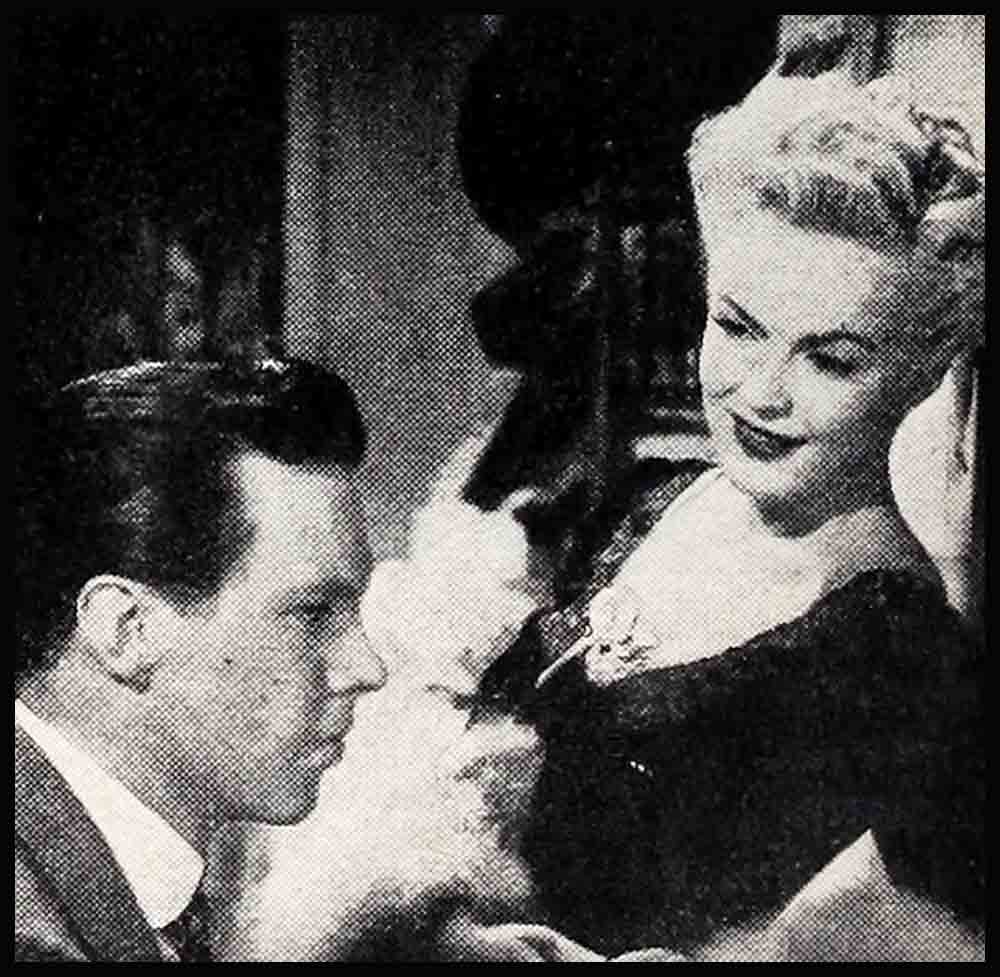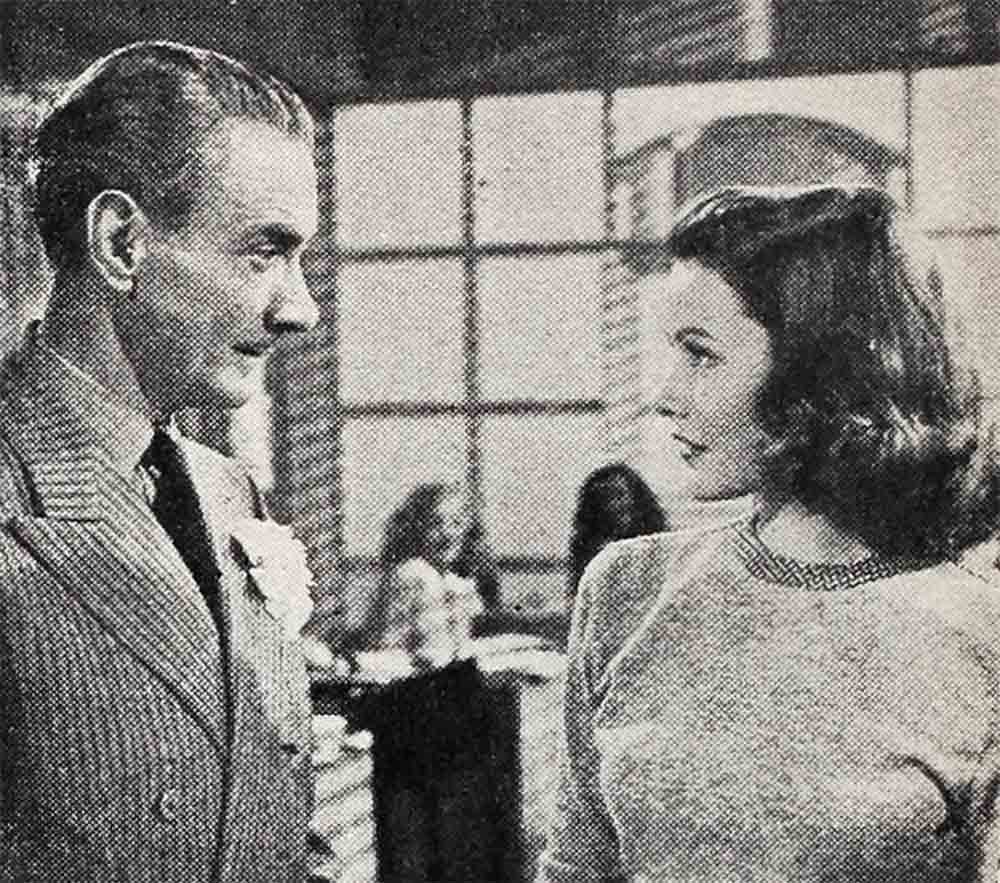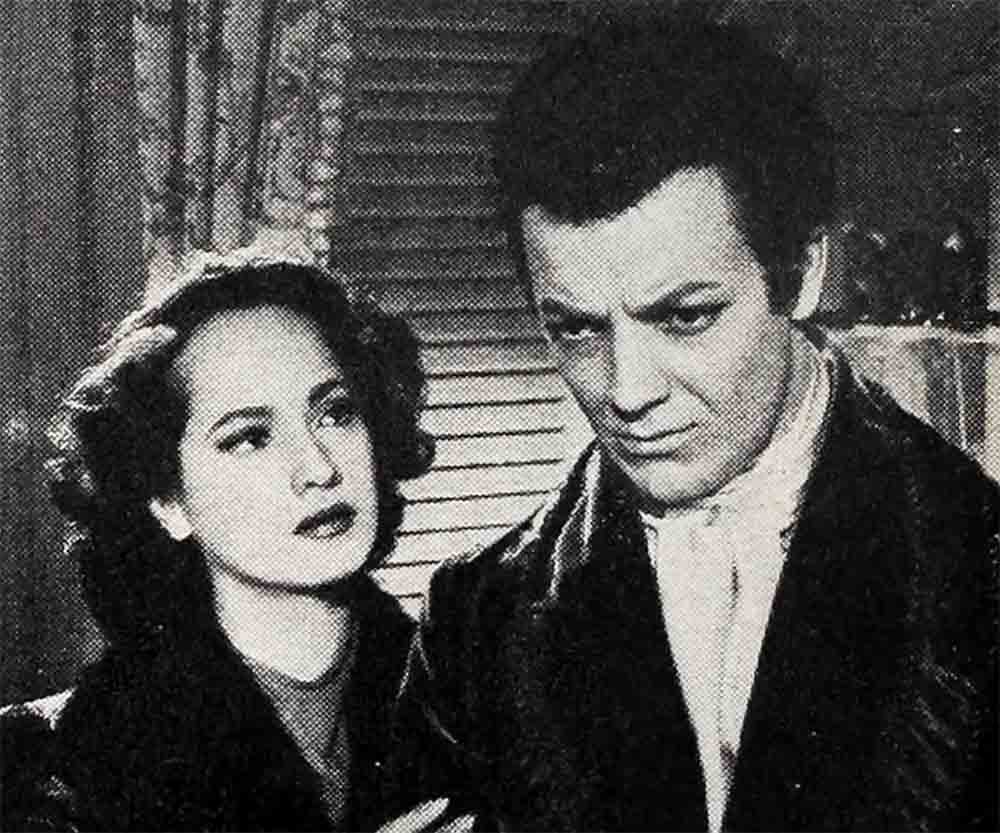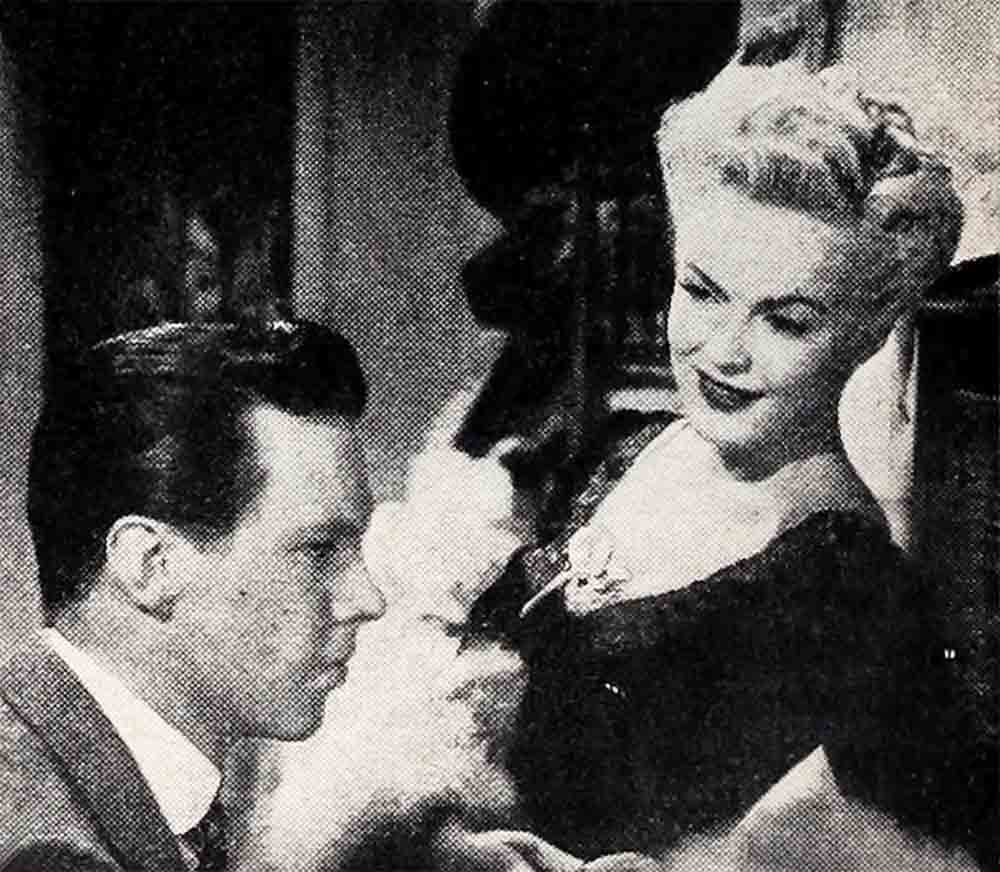
Go Out To A Movie

Laura (20th Century-Fox)
SOPHISTICATED, adult entertainment so beautifully and smoothly executed and so cleverly performed that it’s a joy to behold.
One feels like thrusting forth a restraining hand to hold it just a little while longer in this world of corny, brashy movies, so, like us, you’ll probably go to see it again—to marvel at the smoothly finished performance of stage star Clifton Webb in his first screen role; to enjoy the magnetic appeal of Dana Andrews who emerges a sex-appeal hero, the likes of which you’ve never before seen; to appreciate the beauty and quiet forceful underplaying of Gene Tierney and the humanness of weak characters Vincent Price and Judith Anderson.
It’s a murder mystery involving interesting and alarming people and one with a new and arresting (no puns) angle.
You’ll go home all glowy with its pearl-handled charm and intrigued with its finesse.
Your Reviewer Says: Orchids to Laura.

A Song To Remember (Columbia)
THE influence of a shrewd woman on the life and works of a genius is here splendidly portrayed by Cornel Wilde playing Frederic Chopin and Merle Oberon as George Sand, the woman who brings him into the limelight of fame and little by little enslaves his talents and dominates his person. Even his old teacher, Paul Muni, is kept from the great composer by this designing woman who affects men’s trousers as an expression of her dominating personality.
But at an exclusive concert of Chopin’s, Muni goes as the guest of Franz Liszt and there meets Chopin. Poland’s plight, kept from the composer by Sand, is revealed to Chopin and he agrees to give concerts throughout Europe in order to raise funds to buy the freedom of his old Polish comrades who have fought for Poland while he languished in Paris.
It is the break then between Sand and Chopin—one that lasts until his early death.
The music is the picture—exquisite, exciting, soul-satisfying. all principals turn in exceptional performances with Stephen Bekassy as Liszt, Nina Foch as Constantia and George Coulouris especially outstanding.
Your Reviewer Says: The musical treat of the year.

Irish Eyes Are Smiling (20th Century-Fox)
IT’S young—as young as June Haver and Dick Haymes—and it’s tuneful and happy and forthright too. In short, it’s a Twentieth Century-Fox musical at its coziest, hitting the highlights of the life of Ernest R. Ball, a ballad writer of those Nineties, reputed to be gay and presenting his songs in a lusty manner.
June Haver is so lovely as the girl and Dick Haymes who plays Ball, so manly as the boy who can’t seem to speak those few words that would clear up the misunderstanding between them—you know how it is with screen heroes.
Monty Woolley is priceless as a Broadway promoter and promotes some of the best lines we’ve heard in ages. Or maybe, come to think of it, it’s the way Monty says them.
The songs—among them the title one “When Irish Eyes Are Smiling,” as well as “Mother Machree,” “Let The Rest Of The World Go By,” “Love Me And The World Is Mine,” and “Turn Back The Universe”—are nostalgically lovely and haunting.
The Technicolor is entrancing and the support of Anthony Quinn, Veda Ann Borg, Beverly Whitney and Clarence Kolb most welcome.
Your Reviewer Says: A tuneful honey.
To Have And Have Not (Warners)
LET’S face a fact right off: The news of this picture is a girl, a newcomer, strong, strange and rather wonderful. Her name is Lauren Bacall, and her performance is so intriguing she leaves the rest of the cast and the story itself somewhere behind. It has Humphrey Bogart fighting with all his manly strength to stay in the running.
There is an obvious attempt to parallel “Casablanca,” an attempt that falls short, but “To Have And Have Not” is still punchy entertainment.
“Has anybody here got a match?” is the introductory and thoroughly arresting line of Miss Bacall, delivered in a husky beguiling, bedeviling voice, and from then on, you never lose interest. You couldn’t if you tried despite the same old repetitious theme of brave fearless American Bogart in a foreign port, Martinique this time, with Vichy France slugging it out with its enemies, and Bogie caught in the middle for the sake of dame Bacall.
Not fully developed was the budding attraction between Bogart and Dolores Moran, wife of patriot Walter Molnar, but we got the idea just as Bacall did, and that was sufficient.
At the piano, ladies and gentlemen, is Hoagy Carmichael as Crickett, and very, very good he is, and Walter Brennan as Eddie delivers another of those choice characterizations for which he is noted.
Your Reviewer Says: We Woldn’t have missed it for anything.
The Very Thought Of You (Warners)
HERE is a delightful little story that, like Shakespeare’s candle, shines like a good deed in a naughty world. It’s cozy, chuckly, warming to the heart, gay and sad by turns. It presents four young people—Dennis Morgan and Eleanor Parker, Dane Clark and Faye Emerson, and romantically sends them on their merry way to—well, eventual stardom.
Morgan and Clark are soldiers on furlough who plunge headlong into romance. Family opposition almost ruins the match between Morgan and Miss Parker but love triumphs, of course. Andrea King plays the sister married to a sailor whom she hasn’t seen in two years and to whom she is far from loyal. Georgia Lee Settle is the kid of the family and Henry Travers and Beulah Bondi the parents.
Miss Parker turns in a beautiful performance and Dane Clark’s lightheartedness matched with Faye Emerson’s love of fun is all to the good. William Prince and Marianne O’Brien are nice to have around.
Your Reviewer Says: We could see it again.
The Woman In The Window (International-RKO )
EDWARD G. ROBINSON can play an innocent man inadvertently confused in crime as no one else can. Whether it’s Mr. Robinson’s face, character, or plain old ability, or perhaps all three, we can’t decide. Anyway, he shines again in just such a role—a mild, home-loving professor with a corpse on his hands and in the home of a beautiful woman not his wife, to boot. How he and the girl, played well by Joan Bennett, attempt to escape publicity, ruinous to both, and how the law, futile to evade, finally uncovers them, to the accompanying off-key harmony of a nasty little blackmailer, is the theme of a neatly constructed story that has the audience traveling as sympathetic companions from start to finish.
We liked Raymond Massey’s performance as the District Attorney and Dan Duryea as the blackmailer. What a rodent!
Your Reviewer Says: Don’t monkey with the law, brother.
Alaska (Monogram)
KENT TAYLOR takes up the heroic lead in a Jack London story of the goldmine-saloon-dancing-girl era in Alaska and does he have a time of it, getting arrested for the murder of two claim jumpers who have killed his father; falling in love with Margaret Lindsay, already married to John Carradine, a no-good actor; mixing it up with Nils Asther, saloon proprietor, and finally running down the claim-jumping ring.
Dean Jagger is on the job as U. S. marshal and everything and everyone just about fits into the usual pattern of one of those Alaska things.
Your Reviewer Says: Nothing unusual.
Bluebeard (PRC)
NOW they’ve switched from the tired old mad scientists to an equally mad painter and operator of a marionette show who strangles his models one by one so as not to be disillusioned by them in any way. Uninterruptedly he gets away with his killings, completely and unsuspected, until, through the blunder of an art dealer, he is trapped.
John Carradine gives one swell and utterly hamless performance as Bluebeard. Jean Parker as the girl he loves, Teala Loring her sister and victim of Carradine, Nils Asther as the prefect of police, and Emmett Lynn as an employee of the puppet show, contribute to an enjoyably good horror yarn.
Your Reviewer Says: Goose-pimpley.
The Conspirators (Warners)
LET’S list its virtues: Hedy Lamarr’s beauty, Paul Henreid’s popularity, Sydney Greenstreet’s and Peter Lorre’s superb acting, Victor Francen’s smoothness, Joseph Calleia’s arresting seriousness, the qualities of Vladimir Sokoloff, Edward Ciannelli and Carol Thurston, plus a lavish production, and withal it’s a weak, incredibly dull and repetitious story.
Now who’s to blame for a thing like this? Didn’t someone note the dull theme, dully worded? Didn’t anyone protest at the waste of time, talent and huge sums of money involved? Or has that what’s-the-difference-so-long-as-customers-pay attitude become so universal in Hollywood, no one cares?
At any rate, we’re as disappointed as you must be at this Nazi spy, underground, traitor-in-our-midst thing, if that’s any help to you.
Your Reviewer Says: A just-miss.
OH dear, we’re so weary of delinquent parents and delinquent children and little delinquent movies such as this.
For instance, two middle-class families live next door to each other with Jane Withers, daughter of one, in love with Eric Sinclair, son of the other. But parent Paul Kelly has it in for parent John Litel so when daughter Jane is seen in a bungalow court with Eric, Kelly, not knowing the young pair are married, ups and shoots the lad.
So then we have the trial and the bitterness and the nastiness and, oh shucks, who wants to sit through gluck like this?
Your Reviewer Says: Fog is right.
WE have never caught the so-called humor of Wally Brown and Alan Carney and after viewing this, we’re pretty sure we never will. But they try hard and there’s plenty to intrigue the interest what with Frances Langford’s singing and Vera Vague’s clowning.
Laid out in the Old West during the gold rush, the story, thin as a wafer, has to do with a stranded show-girl troupe and the efforts of Wally and Alan to get them back to civilization.
Frances sings several numbers, beautifully, of course, and Vera keeps everyone in stitches. Bob Mitchum plays the romantic lead opposite Frances and does right well. Paul Hurst teams up for a comedy washday with Vague.
Your Reviewer Says: Thar ain’t too much gold in them thar hills.
PAPA and Mama are rich, doting and addicted to heavy drinking. So neglected son gets a job on his own, meets Mary Beth Hughes, ends up driving a hold-up car, and finally kills his betrayer, George Meeker, in self-defense.
On the witness stand the boy, Robert Lowell, tells his story that so moves the judge he releases the boy.
John Miljan and Vivienne Osborne are the accused parents. But really it’s all such deliberate trash, none of it matters.
Your Reviewer Says: Fiddlesticks!
The Man In Half Moon Street (Paramount)
NOW get this one—Nils Asther is a gay thing of ninety years who every ten years keeps transplanting into his body the glands of young men whom he politely murders for the purpose. This delightful little process keeps Nils looking a divine thirty-five, a fact discovered by his loyal fiancee, Helen Walker. Scientist Reinhold Schunzel aids in the defiance of nature’s law until finally—but that would be telling.
Paul Cavanaugh and Edmond Breon are excellent but why, in heaven’s name, waste the looks and talent of a man like Asther in such fol-do-rol as this?
Your Reviewer Says: Quick, shoot us a few glands.
The Mark Of The Whistler (Darmour-Columbia)
RICHARD DIX turns in a bang-up performance as a derelict who reads, in a discarded newspaper, the names of those being sought by a bank with dormant accounts and among them finds one who has his identical name.
Deciding to pose as the man, he enlists the aid of Porter Hall, owner of a secondhand clothing establishment, and actually collects the sum, close to $30,000, but in escaping from girl reporter Janis Carter, he collides with Paul Guilfoyle, a crippled peddler. And from then on the bruised conscience of Dix leads him deeper and deeper into trouble and he eventually pays the price.
The acting is swell. Guilfoyle, Miss Carter and Dix are aided by John Calvert and Matt Willis.
Your Reviewer Says: A well-knit little picture.
HERE is a mystery with a laugh which is something like goose pimples with cranberry dressing, if you know what we mean.
Anyway, a life insurance salesman suddenly finds himself an appointed watcher over a corpse in a house full of ghoulish relations and the things that go on shouldn’t happen even to an insurance salesman.
Jack Haley is a scream as the poor salesman who sticks to his gruesome task because he has become gooey over Jean Parker, niece of the deceased. Bela Lugosi and Blanche Yurka are a pair, now believe me, and Douglas Fowley, Dorothy Granger and Lyle Talbot are around too.
Your Reviewer Says: At least you’ll be amused.
Shadow Of Suspicion (Monogram)
LOOK, please come into a corner where people won’t overhear while we tell you those jewel thieves are back again. Yes sir, here they are slipping priceless gems into a pair of bronzed baby shoes. And here we are wondering where all these jewels come from that get stolen on the screen when we haven’t so much as a window-glass diamond.
Anyway, Tim Ryan is cute and Marjorie Weaver pretty and Peter Cookson a brave newcomer to tackle this one. Pierre Watkin is the bad papa.
Your Reviewer Says: Let’s give someone a jewel just to stop this nonsense.
FOR sheer organized confusion, dimly lit characterization and intricacy of plot, this picture takes the K rations. And yet the actors perform so well, and the director has managed to establish such well-bred suspense, it has its points.
Ray Milland is the man of the story, released from a British asylum on charges of a mercy killing only to get embroiled in Nazi spies hiding behind a Mothers-of-Free-Nations organization.
When Milland begins to learn too much, he finds himself the victim of another murder rap but even this fails to deter him. As a result he almost loses his life but instead wins the girl.
Marjorie Reynolds becomes a fine actress in the role of the Austrian girl. Carl Esmond is natural and convincing as her brother, Dan Duryea a capable villain and Hillary Brooks a dish-of-tea spy.
Your Reviewer Says: A book of rules is needed with this one.
NOW here’s a switch of characters for you—Dick Powell as a hard-fisted detective taking and giving as good as he gets. And what’s more, Dick emerges from this unpleasant affair peopled. with unpleasant people (and there’s an understatement) with colors (mostly black and blue) flying.
It all happens when stir-crazy Mike Mazurki, an ex-convict, wanders into detective Powell’s office and persuades him to locate the girl Mike lost track of when sent to prison several years previously.
The search leads to the home of wealthy Miles Mander, where Dick Powell meets up with Mander’s nasty wife Claire Trevor and oooh, for heaven’s sake, what goes on.
Anne Shirley is a darling, as Mander’s daughter and the heart interest of Mr. Powell. The two make a delightful couple.
Otto Kruger as a psychiatrist needs a bit of analyzing himself, and Mike is so awful he scared the—well, he scared us, that’s all.
Your Reviewer Says: Such a to-do, really.
Bowery To Broadway (Universal)
FOREWARNED is forearmed, we always say, so right off we caution you customers weary of the show-business theme that here it is again in the form of two theatrical producers—Jack Oakie and Donald Cook, who quarrel their way from lower Broadway to 42nd Street, and finally separate (for about the steenth time) over Maria Montez in an arty production. Well, you know how that turns out and how the story does too, so why go on in that department?
Important, however, is the cast, including Susanna Foster, Jack Oakie, Turhan Bey, Ann Blyth, Louise Allbritton, Frank McHugh, Rosemary DeCamp, Leo McHugh, Leo Carrillo and—well, everybody on the Universal lot but Durbin, and she was too busy on another set to crowd in.
P. S. Jon Hail was in court and couldn’t get off.
Your Reviewer Says: Everybody finally got into the act.
JUST too “booful” for words is this lushy Technicolor dream with Dottie Lamour, once more roaming around in her well-filled sarong. But wait—before you groan—there’s a new angle to all this palm tree hooey and that is that Paramount itself slightly kids its own product, which takes away the irritation it otherwise might create—especially among our jungle jolly G. I.’s who know from first-hand experience it’s not this way.
Anyway the story has Merchant Marine Eddie Bracken relating the tale of his adventures to his pals, of Dottie and her romance with Barry Sullivan, of Gil Lamb’s capering, of Anne Revere (quite a change from her mother role in “Bernadette”), of Reed Hadley, Marc Lawrence and Forrest Orr, of the comical situations in which Bracken finds himself (is there a funnier man anywhere?) and of Lamour’s full-blown loveliness. And while he’s telling it you’ll enjoy it too, so stop huffing and puffing around.
Your Reviewer Says: Whicky, whacky, boo!
EVERY time Hollywood feels called upon to turn out a South American epic, we quiver in our boots (resoled from last year) lest once again our South American neighbors suffer offense. But after carefully analyzing the contents of this harmless and amusing little picture, we feel sure no one could possibly be upset.
True, it kids South Americans as lovers—that is, Virginia Bruce as an authoress takes a few pokes at romantic Latins, and what’s more, travels to the other America to gather material for a second tome on the subject. Here she meets composer Tito Guizar, falls for his romantic wooing, which interferes with his work, is befuddled by Guizar’s close friend Edward Everett Horton, and well—you know how these girl-mad-at-boy things go.
Robert Livingston, Richard Lane, Fortunio Bonanova, Veloz and Yolanda, skip, glide or walk, as the case may be, in and out of the tuneful proceedings.
Ary Barroso, who composed the song hit “Brazil” has contributed “Rio de Janeiro’’ which also has a swingful lilt.
Your Reviewer Says: Fun, romance, music.
It is a quote. PHOTOPLAY MAGAZINE JANUARY 1945




